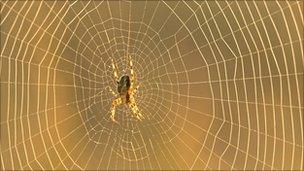Viewpoint: How would nature tackle the cutbacks
- Published

Natural soluction? "Let's ask ourselves how nature would optimise outcomes with limited resources"
There's a Chinese saying that at times of great winds, some build bunkers, whilst others build windmills.
The results and impact of the current round of financial cutbacks and risk of a double dip recession depend first and foremost on how we think about what's happening, not what other people do.
We have more choice than we think about the changes.
For over a decade, we've been living in a society bloated by its own success and excess, congratulating each other on how successful everything has been.
Property prices were going to climb for ever, debt was treated as cash for free and technology was going to sort all of our problems.
The problem is that we have been ignoring the costs that been paid for a shallow success that's only been measured in financial and material terms.
Like the real costs of sub-prime lending that have to come back to bite, the use of subsidies, partial reporting and tariffs skew the true costs of food, social injustice, climate and biodiversity loss and will snap back too unless we make radical, positive changes to the way that we design and use our products and services.
Never has the opportunity for change been as great as it is now as the political, financial, social and environmental needs for common sense outcomes converge towards a single point.
We are tantalisingly close to making decisions that could turn government cutbacks into dramatic, positive results for all.
We are close because the solutions that government and society need already exist, proven and proud, with a guaranteed level improvement that would astonish the most ambitious budget cutter.
There's an encyclopaedia of innovation in nature backed by a £3.9bn year research and development process that has the answers to most of what we need.
Materials stronger than steel and multi-colour ceramics that self-assemble are made in nature every day by 'engineers' with names like Araneus and Helix, the spiders and sea creatures that use organic material to make sophisticated materials that make human efforts look crude.
Entire ecosystems have developed where the connected relationships between every plant, insect, animal, fungi, bird and bug ensure that all waste from one place is food for another.
The system that the UK and Welsh governments is in a mess because it about as far removed from nature's sophistication as it's possible to be.
The answer to the current round of cutbacks is not to try and squeeze more and more from a broken system, but instead to have the courage to look at the problems differently and improve performance by connecting things, not separating them.
So, rather than run scared from the scale of cuts that government ask for, and worry in our bunkers about how on earth we can cope, let's do two things.
Firstly, ask ourselves how nature would solve this crisis and optimise outcomes with limited resources.
Secondly, hold government to its word and start to build the big community and more questions about what's really important - such as "what's the minimum proficiency that I'd expect from all local councillors if I expected them to be able to make the right decisions on energy, transport, food and community for a more secure future?"
Or
"What experience must all children have by the time they leave school so that they can catalyse change in the organisations they work for?" Or "what impact would relocalising food and energy production have on the economy in my area?"
Learning from nature can help to turn arrogance into humility and learn from her genius in organising our relationships, material flows and designs as though we were as bright as we like to think we are.
Asking better questions will start the process of letting go of the idea that less resources mean less results, and lay down the foundations for a more connected, intelligent community where transport, carbon, food and education are connected in ways that reduce health costs by an order of magnitude, and creativity replaces fear as a response to tough times.
- Published13 September 2010
- Published6 September 2010